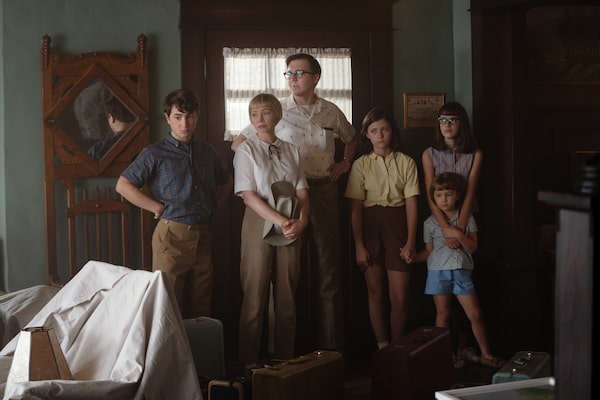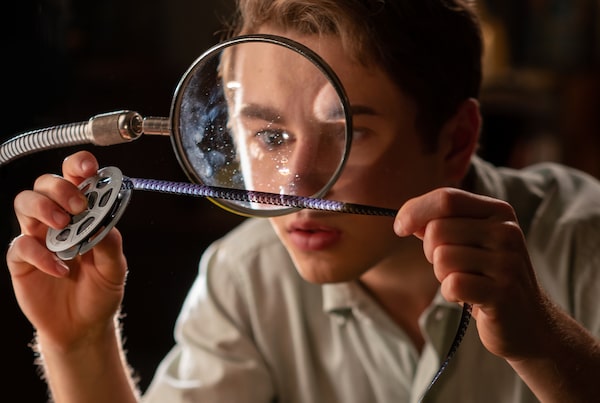
Gabriel LaBelle as Sammy Fabelman in The Fabelmans, co-written, produced and directed by Steven Spielberg.Merie Weismiller Wallace/Universal Pictures and Amblin Entertainment/Universal Studios and Amblin Entertainment
- The Fabelmans
- Directed by Steven Spielberg
- Written by Steven Spielberg and Tony Kushner
- Starring Gabriel LaBelle, Paul Dano and Michelle Williams
- Classification PG; 151 minutes
- Opens in theatres Nov. 23
If it took Steven Spielberg 60 years to make a film about his own adolescence, then I think it is fair to request at least a decade to write a film review of The Fabelmans. Ever since catching its world premiere during this past September’s Toronto International Film Festival – where the coming-of-age drama was greeted as the second coming of Hollywood cinema by the press and well-wishers in attendance – I have dreaded attempting to pull the trigger on a critique. But a deadline is a deadline.
Steven Spielberg is, to my mind, our greatest living American filmmaker. As author and critic Molly Haskell put it in her essential 2018 book of essays, Steven Spielberg: A Life in Films, if the director “hasn’t touched every heart and mind with every picture, it’s a guarantee that he has touched even the harshest critic with one, or two, or three.” I think it is closer to 20 for me, up to and including last year’s tremendous West Side Story. But The Fabelmans did not touch my heart, and it did not touch my mind. It only poked me in the eye, and kicked me in the shins.
Essentially the most expensive home movie ever made, The Fabelmans follows the young Spielberg avatar Sammy Fabelman as he struggles with societal and familial tensions in the 1950s and ‘60s. Introduced as a nervous grade-schooler (Mateo Zoryan Francis-DeFord) en route to his first-ever movie-going experience – an evening screening of 1952′s The Greatest Show on Earth – Sammy is assured by his mother Mitzi (Michelle Williams) that “Mommy and Daddy will be with you the whole time.” Anyone who knows even a splinter of Spielberg’s personal history, which has thematically reverberated in the divorce-laced stories of E.T., Close Encounters of the Third Kind, and other landmarks of pop-Americana cinema, will realize the unintentional, crushing lie in Mitzi’s promise.
But the funny thing about The Fabelmans is that it is not exactly about divorce, the fracturing of the family unit. It is about the great promise of a young man named Steven Spielberg – a portrait of the artist as a young man that is all canvas and no paint.
After becoming entranced with The Greatest Show on Earth, particularly Cecil B. DeMille’s spectacular train crash set-piece, the pint-sized Sammy begins to stage his own spectacles, graduating from tinkering with his toy engines to playing what Orson Welles once called the best train set a boy could ever want: a movie crew. Quickly jumping a decade and a state (New Jersey to Arizona) the film follows the teenage Sammy (Gabriel LaBelle) as he enlists his friends to stage robberies and sieges with the determination of a general, or at least the man who would go on to recreate Saving Private Ryan’s Omaha Beach carnage. Yet aside from the fait-accompli fact that we know how successful our hero will eventually become, Spielberg and his co-writer Tony Kushner give us little to go on as to what makes Sammy run.
Perhaps Sammy is stepping behind the camera to avoid stepping in front of his parents’ crumbling marriage. His father Burt (Paul Dano) is an electronics whiz whose genius keeps uprooting the clan. His mother is relegated to playing house in a revolving series of prefabricated homes, her dreams of being a concert pianist continually pushed to the background. And then there is the couple’s curious relationship with “Uncle” Bennie (Seth Rogen), who works alongside pal Burt while developing something else entirely with Mitzi.

The Fabelmans is essential viewing for some audiences: Spielberg completists certainly, but also Jewish-cinema aficionados, a portion of which are one and the same.Merie Weismiller Wallace/Universal Pictures and Amblin Entertainment/Universal Studios and Amblin Entertainment
Yet if that domestic drama is the connective tissue of The Fabelmans, Spielberg seems reticent to weave his creative self into that fabric. Sammy simply exists as a talented young man, a background character in his own origin story. This deficiency becomes distressingly clear during an extended detour into Sammy’s high-school troubles in California, where he is victim of an antisemitic bully and object of affection of a devoutly Christian girl (Chloe East, wonderful in a tiny part).
Sammy struggles, he perseveres, he triumphs. Yet it is all presented as a story of inevitabilities, with Sammy floating from problem to success with little character details revealed or motivations presented. Fresh-faced Canadian actor LaBelle does a fine job embodying his own director’s best attributes, but because the young performer is given so few nuances to hang onto, he can only do so much but hope for regular thumb’s ups from his real-world counterpart behind the camera.
More attention is paid in the script (the first that Spielberg has helped write since A.I.) toward sketching out Burt and Mitzi, even if the director doesn’t quite have the heart to extend his parents beyond archetypes: Burt is smart and safe, Mitzi frustrated and impetuous. Dano does an impressive job of giving depth to a flat man, but Williams too often flies off into cringeworthy spirals. It is a tremendously heartfelt performance from Williams that requires at least a modicum of discipline from her director, which Spielberg is seemingly, and perhaps understandably, loath to offer. The ultimate result is an embarrassing thing to witness, especially as the film crawls toward the 150-minute mark – and this is a hill of judgment I’m willing to die on given the otherwise bafflingly rapturous reception to Williams’s work.
Judd Hirsch (as Sammy’s half-ferkacte great-uncle) and David Lynch (as eye-patched director John Ford, who Sammy encounters late in the film) have the right idea here: get in and get out, delivering sincerely insane performances as opposed to insanely sincere.
Still, The Fabelmans is essential viewing for some audiences: Spielberg completists certainly, but also Jewish-cinema aficionados, a portion of which are one and the same. If Spielberg’s cold and tortured revenge thriller Munich was his cinematic equivalent of the Talmud, then the open-hearted, didactic Fabelmans is his Torah. (I’m not sure what Schindler’s List might be.) The film’s Shabbat-dinner squabbles, Christmas-lights envy, and volleys of antisemitic slurs thrown at Sammy seem to be stirring most of Spielberg’s soul here. So explicitly Jewish in the personal and cultural if not spiritual sense is The Fabelmans that it makes a fascinating double bill with James Gray’s recently released drama Armageddon Time – which also happens to be an autobiographical memory play. But whereas Gray’s film views his own family history through a relentlessly and uncomfortable introspective lens, The Fabelmans is more self-celebration than interrogation.

The Fabelmans contains reels’ worth of beauty and wit, all delivered with the honest and enthusiastic drive to entertain that has become Spielberg’s signature.Merie Weismiller Wallace/Universal Pictures and Amblin Entertainment/Universal Studios and Amblin Entertainment
Not that the film is self-indulgent, like this season’s third movie-about-a-moviemaker (Alejandro G. Inarritu’s dreadful Bardo). The Fabelmans contains reels’ worth of beauty and wit, all delivered with the honest and enthusiastic drive to entertain that has become Spielberg’s signature. But you will learn more about Steven Spielberg by watching almost any other Steven Spielberg film.
 Barry Hertz
Barry Hertz